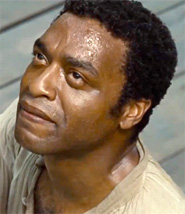Can a Slave Owner Be a Good Man?
Posted on Nov 29, 2014 by Trevor in Misc
 In Solomon Northup’s biography Twelve Years a Slave, he documents a heartrending account of his experiences. Born free in New York, he married and started a family. Then tragically he was kidnapped into slavery in the South where he spent the next twelve years of his life in hellish, brutal bondage.
In Solomon Northup’s biography Twelve Years a Slave, he documents a heartrending account of his experiences. Born free in New York, he married and started a family. Then tragically he was kidnapped into slavery in the South where he spent the next twelve years of his life in hellish, brutal bondage.
His first owner was a uniquely benevolent man, as it turns out. Northup, writing in retrospect, had some kind words for the man, almost forgiving him for not knowing any better. He wrote:
Our master’s name was William Ford. … He is now a Baptist preacher. Throughout the whole parish … he is accounted by his fellow-citizens as a worthy minister of God. In many northern minds, perhaps, the idea of a man holding his brother man in servitude, and the traffic of human flesh, may seem altogether incompatible with their conceptions of a moral or religions life. From descriptions of … [other subsequent slave owners] hereinafter mentioned, they are led to despise and execrate the whole class of slaveholders, indiscriminately. But I was sometime his slave, and had an opportunity of learning well his character and disposition, and it is but simple justice to him when I say, in my opinion, there never was a more kind, noble, candid, Christian man than William Ford. The influences and associations that had always surrounded him, blinded him to the inherent wrong at the bottom of the system of Slavery. He never doubted the moral right of one man holding another in subjection. Looking through the same medium with his fathers before him, he saw things in the same light. Brought up under other circumstances and other influences, his notions would undoubtedly have been different. Nevertheless, he was a model master, walking uprightly, according to the light of his understanding, and fortunate was the salve who came to his possession. Were all men such as he, Slavery would be deprived of more than half its bitterness.
It’s staggering to me that a man kidnapped from a free life in such a horrible way could have room in his heart to write such charitable words about someone who upheld the institution of slavery. Northup seems to be a real-life Atticus Finch, willing to forgive the shortsightedness and ignorance of others to enormous degree and with such calm patience, despite the very direct and abusive impact they had on his own life.
Later, he writes this about the institution of slavery being the culprit more than the men running it:
It is not the fault of the slaveholder that he is cruel, so much as it is the fault of the system under which he lives. He cannot withstand the influence of habit and associations that surround him. Taught from earliest childhood, by all that he sees and hears that the rod is for the slave’s back, he will not be apt to change his opinions in maturer years.
This also blows my mind, because in my experience, when I witness bigotry and cruelty, it’s much easier to blame the individuals themselves. To instead direct that animosity toward the abstract, as Northup does, is a pretty impressive act of discipline.
Taking this further, I ponder the modern-day parallels where I might be a better man if I look upon those around me with a similar degree of charity when they fail to meet the moral standards I expect. Or, perhaps even more importantly, I hold up Northup’s sentiments to future generations who might view my generation’s moral compass as woefully underdeveloped.

